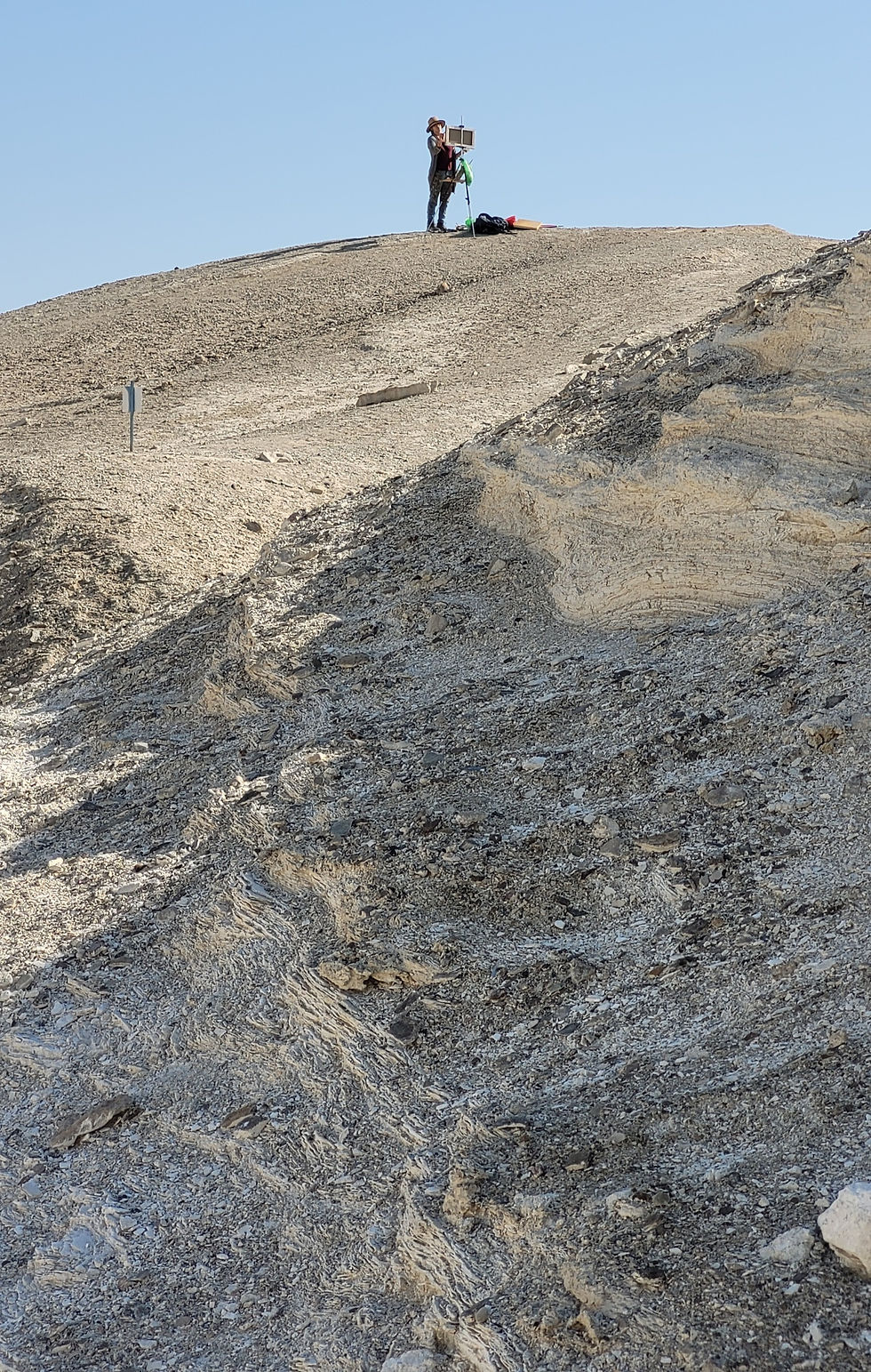Plein Air Painting Trip to the Dead Sea
- nettacanfi
- Dec 19, 2022
- 3 min read
Updated: Mar 3, 2023
Two weeks ago I joined two brave and amazing artists on a painting trip to Mount Sdom near the Dead Sea.
Aviya Halabi took us to a look-out from the top of the mountain to the Dead Sea and the plain of Amiaz, and there we got to work!

We got up at five in the morning to paint the sunrise on the Dead Sea beach in Neve Zohar. I did two small paintings on Fabriano's oil paper. It was a good warm-up.
Then we went up to Mount Sdom with all the equipment and painted there all day, and we also had time for a sunset session at the Ein Bokek observation point.
Five paintings in one day is a lot for me.
The next day it took us longer to get moving, but we managed a long session on Neve Zohar look-out point before the drive back home. Here's the loot:
(click on the images for full size)
Sdom Mountain Lookout
This mountain is essentially a block of salt, and there is not a single plant there. The walls of the canyon crumble to the touch, and everything sparkles from the salt crystals.
Aviya told us from the beginning, give it up, the marl gets into everything.
I settled in the white powder, trying my best to keep it from mixing with the colors.



Man Made Lanscape
I haven't been to the Dead Sea in several years.
The place was always magical for me, but this time I had another goal: I wanted to paint the pools.
There is no doubt that the evaporation ponds of the Dead Sea Works fall under the definition of a "man-made landscape".
For several years I have been exploring such landscapes in my paintings. So far I've painted mainly the agricultural landscape of Giv'at Ada and its surroundings, the covered trees and archeological Tels.
These pools are of a different order of magnitude.
I arrived a day before Aviya and Aya, so while I had time to kill I reacquainted myself with the surroundings.
I walked around the beautiful promenade of the hotel area in Ein Bokek, spent an hour looking for the entrance to the Aroma Espresso Bar, and also went to the new visitor center of the Dead Sea Works.
My father worked there for 40 years, and I also worked for a while as a chemical technician.
The place always looked like a science fiction movie to me.
A huge and complicated factory, terrible heat that drains the water from your body even at two in the morning, and the constant snow of potash that covers everything.

It turns out that you can enter the visitor center only by appointment. I waited a bit, and joined a random group that had arranged the visit.
We had a funny and knowledgeable guide, and the exhibits are simply stunning.
The place is top notch. Very suitable for escaping to the air conditioner if you are there in the summer, because it is actually a transition from one pavilion to another, each of which awaits a different experience. There are many reconstructions of the original buildings and tents of the labor camp.
Later at home I got the uncensored version of Musia Langotsky from my dad, but that's another story :)
At the end came the inevitable questions - are the factories drying up the lake? So yes, but their fault is the small part.
The sea is drying up mainly because the Daganiya Dam has been closed for years and water from the Jordan River has stopped reaching it.
If it weren't for the pools of the factories, there would be no "sea" in the southern basin at all.
Geometric Shapes Drawn by Giant Machines
As an artist, this is the interesting part for me: the way in which we shape the landscape for our needs.
The factories' pools are so large that most visitors to the Ein Bokek hotels are not even aware of the fact that they are wading in a pool.
The geometric edges of the pools have become an iconic part of the landscape. This is what the Dead Sea looks like. That's how we know it.

When I painted the pools from the Neve Zohar lookout, I also saw the color changes in the steps in the water - the areas where the barge has harvested the carnallite salts are darker, deeper.
It's an engineered landscape, drawn by huge machines.
The lighting was completely flat, and I felt like I was coloring a poster.
This geometric division of the lake is similar in my mind to the checkered green landscape of the Jezreel Valley.
Both are "fields". Both are used primarily to create food, and both are "harvested".

Unlike the whole day we spent on Mount Sdom without seeing a living soul, everyone stops at Neve Zohar to look at the view.
I met a group of Ukrainian giants who looked sun-drunken, Chinese tourists with dizziness from the turns of the descent from Arad, and girls taking selfies against the background of the pools.
No doubt, the Dead Sea is good for the skin :)

















Comments